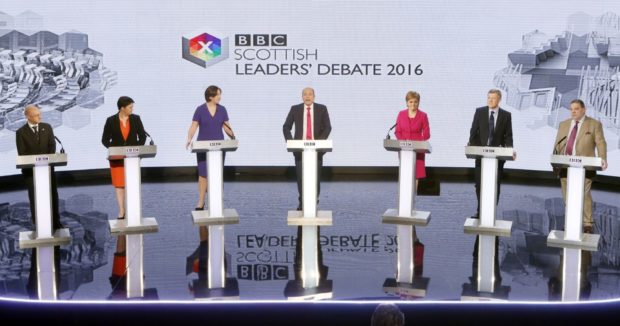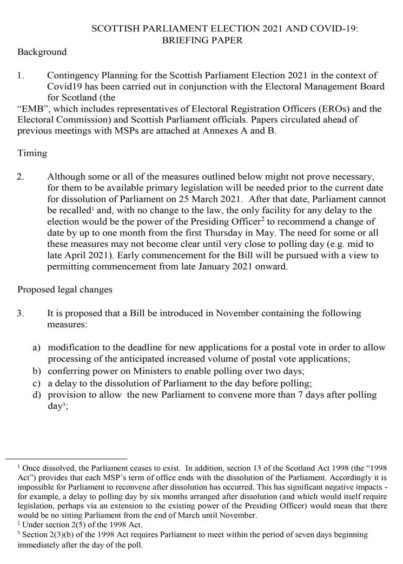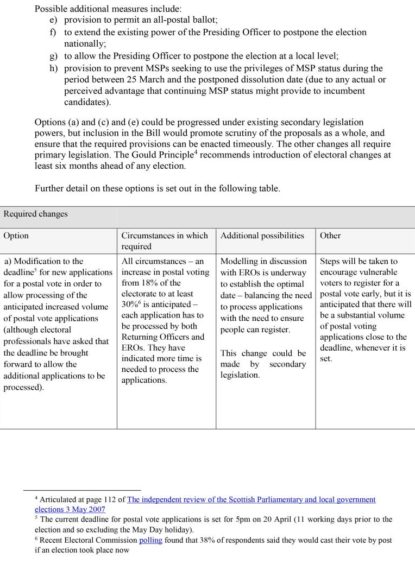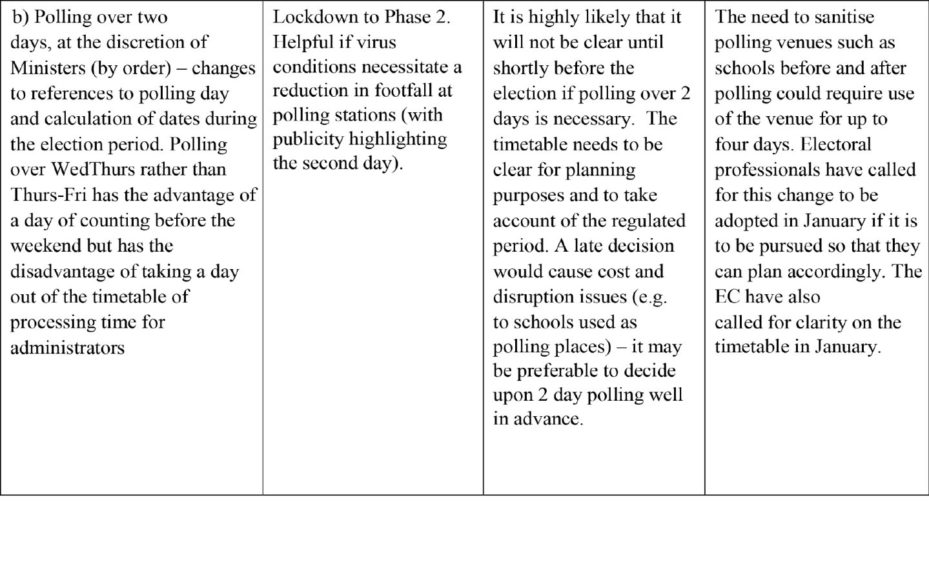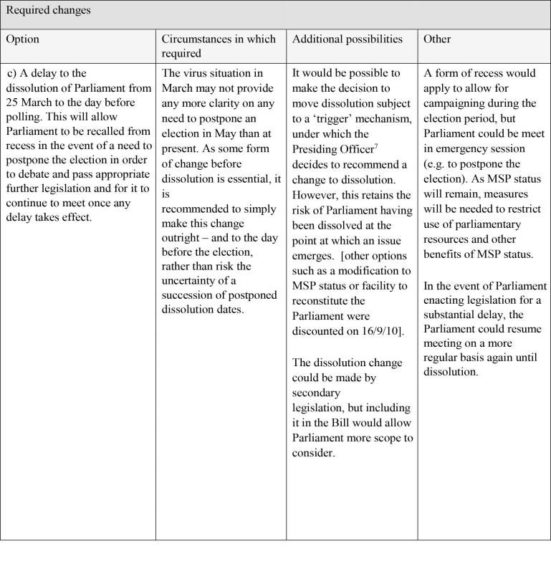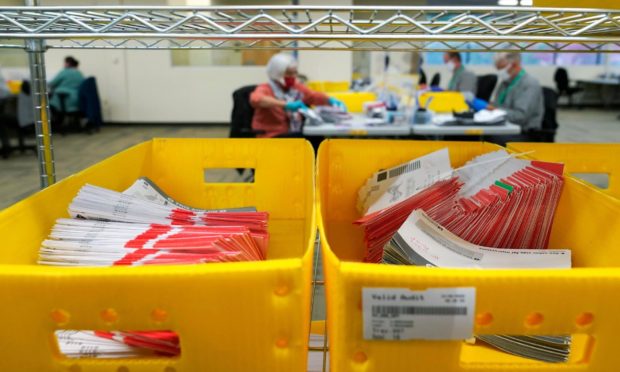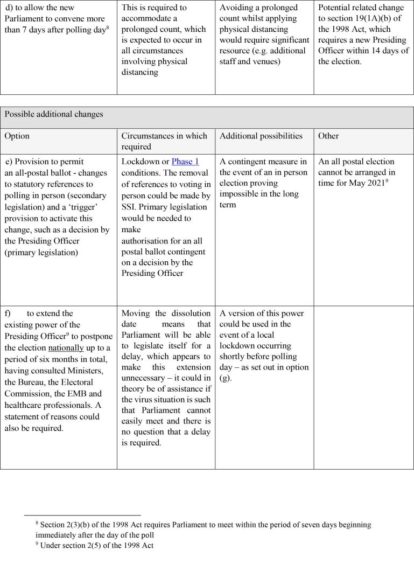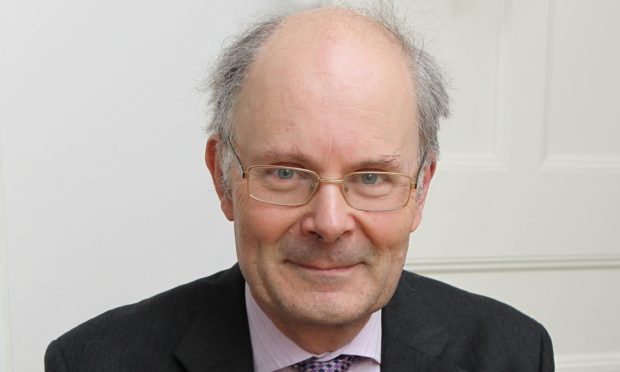Emergency plans that would enable next year’s Scottish election to be postponed are under consideration to prevent coronavirus spread, according to a secret Scottish Government document.
The cancellation of May’s crucial contest is just one of a series of proposals outlined in the government paper, which has been uncovered by us through Freedom of Information legislation.
Holding a two-day poll to facilitate social distancing, having a seven-day count for the same reason and arranging an all-postal ballot are among the options explored in the document.
The document examined “contingency planning” for the election “in the context of Covid 19” and was produced in conjunction with the Electoral Management Board for Scotland (EMB) and Scottish Parliament officials.
The briefing paper, which was circulated in September on an “in-confidence basis”, says the measures may not prove necessary and it may not become clear what contingency plans are required until very close to polling day in May.
Bill could be introduced this month
The paper says that for the contingency options to be available legislation will have to be passed before parliament is dissolved on March 25.
The document proposes introducing a Bill at Holyrood this month. The legal changes would allow the postal vote deadline to be changed to allow the surge in ballots being sent through the mail to be processed.
It would also give ministers the power to hold the election over two days instead of one. And crucially it would delay the dissolution of parliament until the day before the current election date of May 6.
Delaying the dissolution date until then would allow MSPs to be recalled to Holyrood to pass the legislation required to postpone parliament at the eleventh hour.
The legislation would also contain provision to allow the new parliament to convene seven days after votes were cast in order to accommodate the prolonged count, if such an arrangement is required for social distancing.
The document also mentions “possible additional measures”, which include extending the power of Presiding Officer Ken Macintosh to allow him to postpone the election for up to six months.
It was noted that such an extension of power might be unnecessary given that delaying the dissolution date would enable Holyrood to legislate on postponing the election itself.
But on the other hand, it said empowering the Presiding Officer to postpone the election might help if the virus was so virulent that parliament could not meet and an urgent decision was required.
All-postal ballot
Another possibility was creating the power to delay the election locally, whereby polling could be held back in a geographical area to prevent the postponement of the entire election.
It also puts forward the possibility of allowing an all-postal ballot in the event of voting in person being “impossible” in the long term, but warns that such an arrangement could not be put in place in time for May next year.
Another provision under consideration was a by-product of a move to delay the dissolution of the Scottish Parliament.
The document suggested there should be provision to make sure sitting Holyrood politicians were unable to use their continued status as MSPs to get an advantage over rival candidates in the run-up to the election. But the document conceded that devising a workable sanction in such circumstances would be challenging.
Professor Sir John Curtice pointed out that the document had been circulated before the encouraging news about Pfizer’s work on a coronavirus vaccine.
The political expert, based at Strathclyde University, said there would only be a postponement if there was an “enormous problem” with the virus, given the determination south of the border to hold local elections on the same date after a year’s delay.
How soon is now?
Professor Curtice said it would not be in the interests of the SNP if the Scottish election was delayed, given the party’s ascendancy in the opinion polls.
“If you are like the SNP and are at 54% in the constituency vote, it is not in your interests to wait. At the moment, people’s voting intentions for next year are heavily a function on their views about independence.
“Independence is at 54%, support for the SNP is at 54%, so why wait?” Professor Curtice said.
He also suggested that any delay would take some pressure off the UK Government as it faces SNP demands for a second independence referendum.
“There’ll probably not be a referendum next year because there will still be the fall out from coronavirus,” Professor Curtice said.
“But if you are going to persuade the UK Government to do anything at all, the UK Government will want a bit more space between any date and 2014 – so 2022 possibly. But if you delay the election for six months then everything gets delayed, then the pressure is off the UK Government for another six months.”
He added: “Given the SNP wish to use this election in order to be a battering ram in order to hold an independence referendum in a reasonable timeframe and given they are on 54% in the opinion polls… why wait?”
